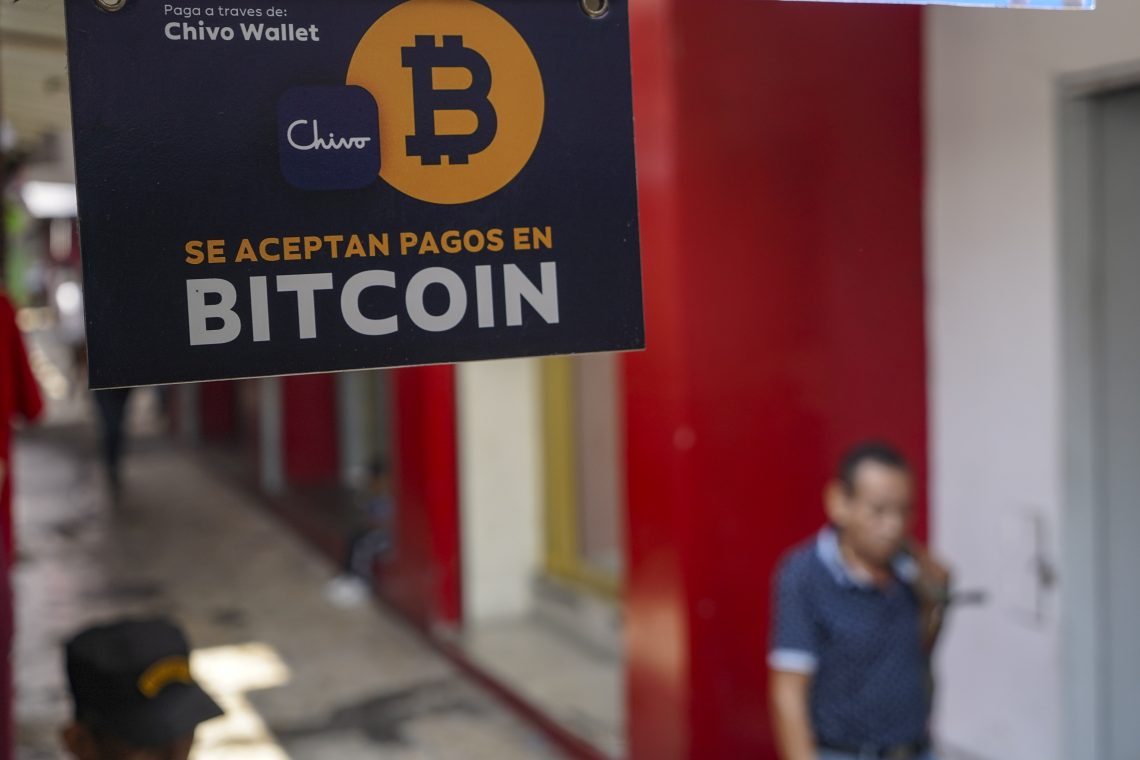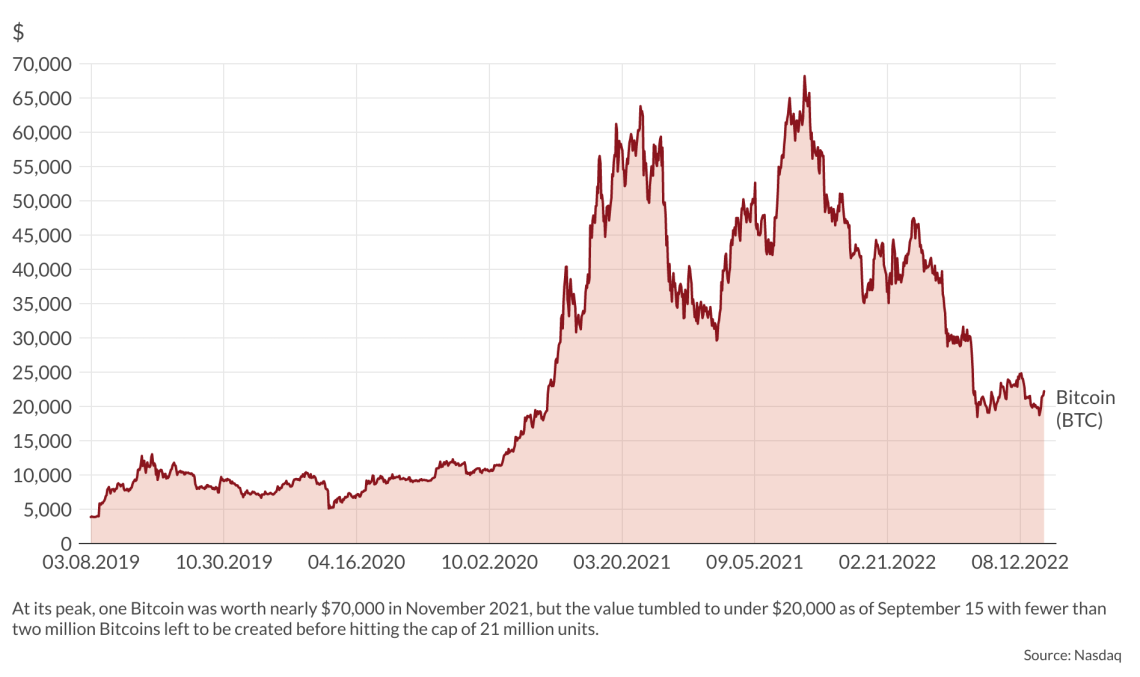With the most well-liked cryptocurrency Bitcoin shedding worth, its advocates are disheartened. However crypto is right here to remain whereas regulation and taxation are seemingly coming.

In a nutshell
- Cryptocurrency is perceived as a speculative funding and a retailer of wealth
- It isn’t gaining recognition as a method of fee for unusual transactions
- Ignore, ban or regulate? Governments will seemingly select the third possibility
Cryptocurrencies have suffered a tough beating over current months. For instance, the U.S. greenback/Bitcoin trade price fell from virtually $70,000 in early November 2021 to beneath $20,000 in late June and, regardless of ups and downs, dipped to $19,733 on September 15.
Traditionally, Bitcoin – by far the most popular type of cryptocurrency – has been a hit story for many who purchased it: the trade price versus the greenback was beneath $3,000 5 years in the past. But, many bitcoin advocates have been disenchanted in two respects. This cryptocurrency has did not turn out to be a widespread technique of fee and has turned out to be a poor protection of buying energy in durations of uncertainty and inflation. That is stunning. Bitcoin’s provide is proscribed to 21 million items. Since greater than 19 million items, or 90 p.c, have already been issued (“mined”), most individuals anticipated that the cap would have prompted a continuing rise in its dollar-denominated value.
What’s the future?
To foretell future eventualities for cryptocurrencies, it could be helpful to think about what occurred previously and make clear just a few key factors. First, the world of blockchain consists of cryptocurrencies and crypto derivatives. For instance, Bitcoin is a cryptocurrency whereas stablecoins Tether and TerraUSD are crypto derivatives. These are “derived” from cryptocurrencies and/or pegged to a well known and centralized foreign money, just like the dollar. Put merely, a monetary investor fingers out {dollars} to an organization and receives a spinoff in return. The corporate converts the {dollars} into cryptocurrencies and lends them to world debtors. On the similar time, the corporate guarantees the monetary investor to trade the derivatives on demand for a set quantity of a given cryptocurrency, presumably pegged to the greenback, or backed by {dollars}.
The upshot is that when you have purchased Bitcoins or different cryptocurrencies, you win/lose following the trade price of the cryptocurrency in your portfolio. When you’ve got purchased a spinoff, nonetheless, you might discover out that it isn’t actually backed by an enough amount of cryptocurrencies or that the dollar-convertibility assure is porous, to say the least. If that’s the case, the spinoff seems to be all however nugatory. That is what occurred throughout the previous few months with a number of crypto derivatives. Corporations issuing such merchandise are very energetic available on the market and contribute to creating the underlying belongings unstable, particularly in the event that they promise stellar returns, which increase the demand for cryptocurrencies and crypto derivatives. If the derivatives merchandise are poorly collateralized, traders are scared away in dangerous instances.
The 2022 crash within the crypto market has hit the world of derivatives, presumably eliminating a serious supply of volatility.
A second key level is that cryptocurrencies are presently thought of each a speculative instrument and a retailer of wealth, somewhat than a method of fee for unusual transactions. For instance, greater than 60 p.c of the full bitcoins in circulation are held in accounts (“wallets”) with greater than 100 Bitcoins each, and are hardly ever traded available on the market, aside from to regulate portfolios: in late July 2022, solely about 250,000 Bitcoins have been traded each day and it’s seemingly that only a small portion associated to business transactions. Furthermore, cryptocurrency holders appear to have a long-term view. For instance, each “shrimps” and “whales” (accounts with lower than 1 and over 1,000 Bitcoins every, respectively) have taken benefit of the current sell-off to purchase the dip in giant quantities.
Three preliminary conclusions observe: (1) the long-run method of the everyday cryptocurrency holder means that the cryptocurrency challenge is not an easy kill, and survives dramatic volatility; (2) volatility has been pushed by crypto derivatives, the exercise of which has been magnified by the comparatively small quantity of cryptocurrencies traded available on the market; (3) the 2022 crash within the crypto market has hit the world of derivatives, presumably eliminating a serious supply of volatility by killing some market movers, hitting short-run speculators and providing alternatives to long-run crypto traders.
Details & figures
Based mostly on ‘nothing’ however value one thing
After all, cryptocurrencies aren’t like shares and bonds, that are backed by guarantees of future earnings streams, generally generated by an organization’s profitable market efficiency and generally by a governmental dedication to squeeze taxpayers. As a substitute, cryptocurrencies are financial items backed by nothing and their worth is determined by their credibility as a future means of fee to purchase items, providers and different technique of fee.
In the long run, regulation appears to be the most secure technique.
Central bankers and policymakers on the whole don’t miss an opportunity to warn the general public that cryptocurrencies are a rip-off. European Central Financial institution President Christine Lagarde not too long ago declared that cryptocurrencies are “primarily based on nothing” (right) are “value nothing” (incorrect) and that regulation is required to forestall inexperienced traders from shedding all the cash they put into cryptos (incorrect).
Mockingly, central bankers provide digital currencies, which in President Lagarde’s view are “vastly completely different” from cryptocurrencies. Central bankers’ digital currencies are definitely completely different from blockchain-based cryptocurrencies, however not for the explanation Ms. Lagarde most likely has in thoughts. The important thing subject is that decentralized currencies with a provide cap would get rid of the very notion of financial coverage and remodel central bankers into an company regulating business banking and producing statistics. Understandably, the world of central banking just isn’t happy with the prospect.
In different phrases, central bankers aren’t hostile to cryptocurrencies as a result of they’re allegedly fraudulent. If fraud means “primarily based on nothing,” then all central bankers ought to be taken to court docket. Fairly, their hostility comes from the truth that widespread acceptance of cryptocurrencies will ultimately undermine the privileges of central banking, with repercussions, say, on the financing of public indebtedness.
Eventualities
Policymakers and central bankers have three prospects.
Ignore
They will ignore, outlaw or regulate cryptocurrencies. The primary plan of action is the simplest. Why ought to central bankers trouble? In any case, the world of cryptos is extremely aggressive and a few currencies will disappear. Furthermore, in the present day they don’t seem to be an actual risk to cash. Shifting from {dollars} or euros to a number of cryptocurrencies just isn’t straightforward: the price of every transaction remains to be comparatively excessive. So long as governments settle for centralized currencies like {dollars} and euros as the one technique of fee, a transfer to cryptos would really be equal to switching to a cumbersome double-currency regime that many individuals would dislike. These regimes existed previously, however for brief durations of time.
Outlaw
Outlawing cryptocurrencies would make little sense until the authorities feared that giant transactions involving cryptos might destabilize the fiat-currency trade charges. Moreover, outlawing cryptocurrency should essentially be a worldwide transfer. It might lose credibility if some nations refused to conform. The basic downside with this method is that the existence of cryptocurrencies and crypto derivatives just isn’t against the law, and it’s removed from evident that those that purchase them are performing towards the general public curiosity.
Regulate
In the long run, regulation appears to be the most secure technique. With none practical short-term risk to fiat cash as a method of fee or proof of their use in cash laundering, the one true concern of the authorities is taxation. That is the only merchandise on which the regulator is prone to focus. It has little to do with the decentralized characteristic of cryptos, however somewhat the tax collector has no technique to learn how a lot wealth the taxpayer has saved away, and it could be very laborious even to know whether or not a person has an account. Future regulatory efforts will go within the route of forcing larger transparency with the purpose of monitoring and taxing this type of wealth.
In early July, the European Parliament accredited the Market-in-Crypto-Belongings proposal. If carried out on a worldwide scale, crypto-asset suppliers won’t be allowed to function with out authorization. This authorization will undoubtedly include strings hooked up – in concept, to guard traders from fraud, in follow, to power them to make their accounts seen. That is solely the start until know-how makes licensed sellers redundant.
